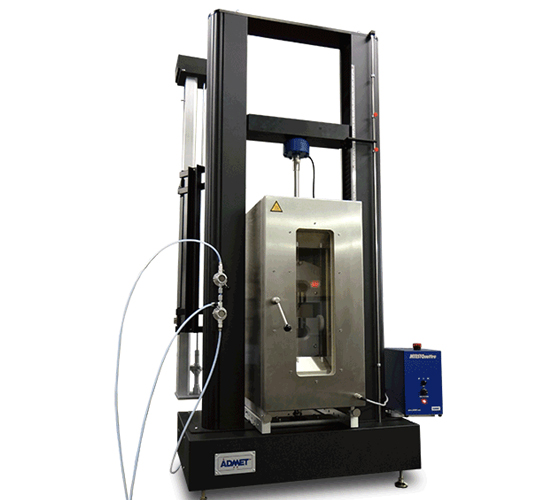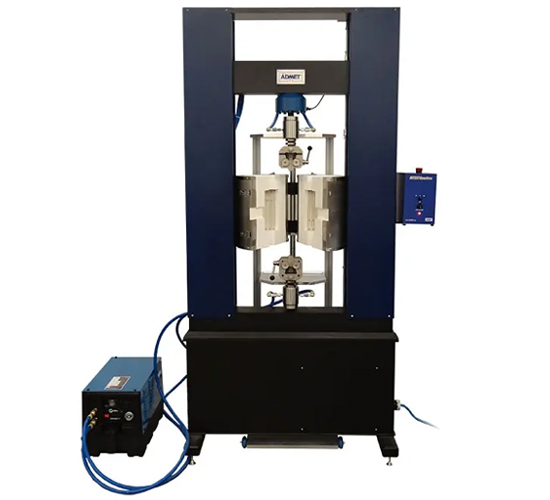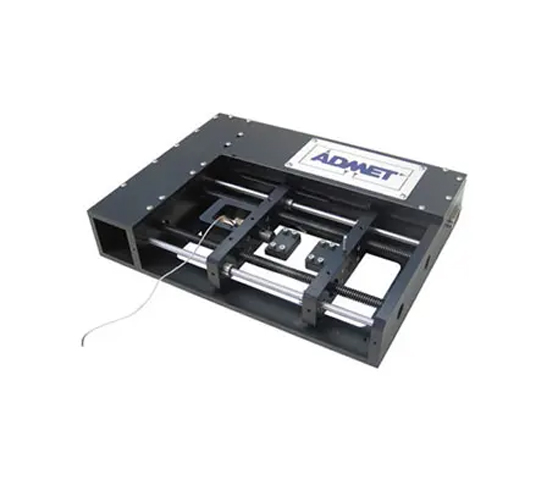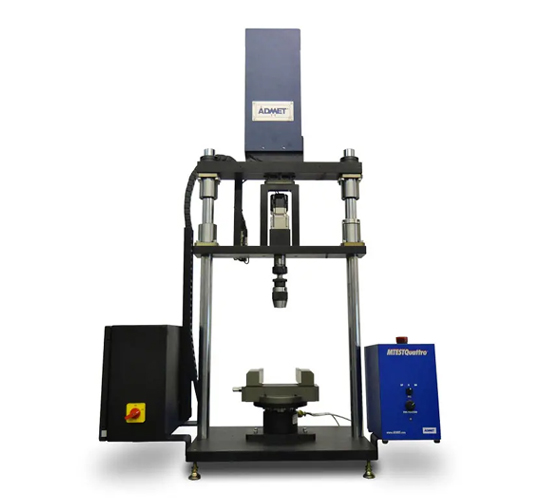
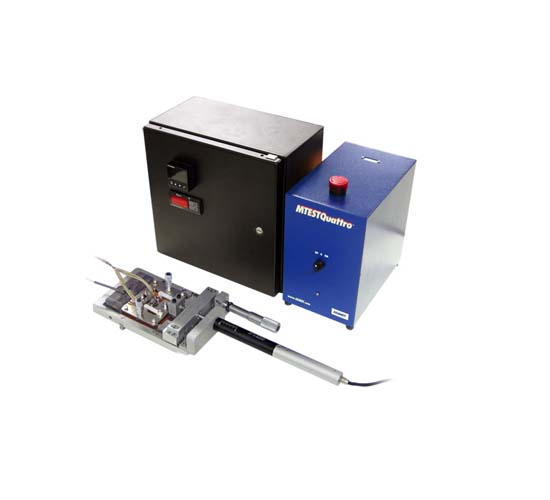
The Bio Tense Perfusion Bioreactor is a cutting-edge tool designed for high-resolution investigations in Mechanobiology. Ideal for tissue engineers and cell biologists, this bioreactor offers advanced testing capabilities for cellular behavior and extracellular matrix production.
Bio Tense Perfusion Bioreactor, mechanobiology, tissue engineering, cell biology, fibroblast behavior, extracellular matrix production, high-resolution investigation, inverted microscope, cell sheet motions, custom design, biological testing, cellular analysis, mechanobiological research, tissue culture, cell dynamics, research tools.
ADMET Bio-Tense Bio Reactor Testing Machine Overview
The ADMET Bio-Tense Bio Reactor Testing Machine is specifically designed for testing and analyzing the mechanical properties of bio-materials and tissue-like substances under controlled conditions. This advanced system is used for simulating the biomechanical environment in which biological tissues operate, offering a versatile solution for research in biomedical engineering and tissue engineering applications.
The machine provides precise control over parameters such as strain, force, and pressure, allowing for accurate testing of materials under various simulated biological conditions. It is equipped with specialized fixtures and sensors that ensure reliable data collection for applications in medical device testing, prosthetic development, and regenerative medicine. The ADMET Bio-Tense Bio Reactor Testing Machine can simulate conditions such as tensile, compressive, and cyclic loading, ensuring comprehensive testing of bio-materials’ behavior and performance.
The ADMET Bio-Tense Bio Reactor Testing Machine is designed for simulating and testing the mechanical properties of biomaterials under controlled biological conditions. This advanced testing system is specifically developed to handle the needs of the biomedical, pharmaceutical, and tissue engineering industries. Below are the key features of the ADMET Bio-Tense Bio Reactor Testing Machine:
Precise Mechanical Testing for Biomaterials
The Bio-Tense Bio Reactor Testing Machine offers precise control over mechanical testing of biomaterials, including those used in medical implants, tissue engineering, and drug delivery systems. It allows for the testing of materials under physiological conditions to ensure the integrity and performance of biomaterials over time.
Simulated Physiological Conditions
The machine is capable of creating and maintaining an environment that mimics physiological conditions, such as temperature, pH, and fluid flow. This allows for accurate testing of biomaterials in conditions similar to those they would experience in the human body, providing valuable data for R&D.
Controlled Temperature and Humidity
The Bio-Tense machine includes a temperature control system that maintains a consistent environment, ensuring that samples are tested under stable conditions. This is crucial for accurately assessing the performance of biomaterials in conditions that mimic the human body’s natural environment.
Dynamic Loading and Strain Testing
The machine supports dynamic loading capabilities, allowing for testing of biomaterials under cyclic loads and various strain conditions. This is essential for simulating the stresses and strains that biomaterials might undergo in real-world applications, such as in joint replacements or vascular implants.
Customizable Test Parameters
The Bio-Tense Bio Reactor Testing Machine allows users to adjust key testing parameters, such as load, displacement, frequency, and time. This flexibility makes it suitable for a wide range of testing protocols, from material characterization to accelerated aging tests.
Biofluid Compatibility
The machine is designed to test materials submerged in biofluids such as blood or tissue culture media. This capability enables the assessment of biomaterial properties in realistic biological environments, which is critical for evaluating the long-term performance and biocompatibility of implants and prosthetics.
Real-Time Data Collection and Analysis
The system provides real-time data collection and analysis, ensuring that test results are captured and analyzed immediately. This helps researchers and engineers assess the performance of materials on-the-fly, speeding up the development process for new biomaterials and devices.
Advanced Control and Software Interface
The Bio-Tense Bio Reactor Testing Machine features an intuitive software interface that allows users to easily set up and control tests. The software includes built-in analysis tools for interpreting data, simplifying the decision-making process and enabling efficient optimization of biomaterials.
High-Precision Force and Displacement Measurement
The machine utilizes high-precision sensors for force and displacement measurement, ensuring accurate and reliable results in both static and dynamic tests. This precision is crucial for evaluating the mechanical properties of materials in biomedical applications, where performance and safety are critical.
Versatility in Testing Applications
The Bio-Tense Bio Reactor Testing Machine is versatile and can be used for a variety of applications, including tensile, compression, fatigue, and stress-strain testing of biomaterials. It is ideal for testing materials used in orthopedics, cardiovascular implants, tissue scaffolds, and other biomedical devices.
Long-Term Durability Testing
With its ability to simulate long-term conditions, the Bio-Tense machine is particularly suitable for accelerated aging and durability testing. This is essential for assessing the lifespan of biomaterials and ensuring their longevity in medical applications.
ADMET Bio-Tense Bio Reactor Testing Machine – Specifications
The Bio-Tense Perfusion Bioreactor is designed for tissue engineering and cell biology applications, enabling high-resolution mechanobiology investigations. It sits atop the XYZ stage of an inverted microscope and offers the following key specifications:
This bioreactor is an ideal tool for studying cellular response to mechanical forces and strain in a controlled, high-resolution environment.
The ADMET Bio-Tense Bio Reactor Testing Machine is designed for advanced mechanobiology investigations, offering cutting-edge solutions for studying cellular behaviors under mechanical stimuli. This system enables researchers to simulate real-world mechanical environments for biological tissues and cells, providing critical insights into tissue engineering and cellular responses.
Advanced Mechanical Stimulation
Long-Term Monitoring
High Magnification Imaging
Versatility in Testing
The ADMET Bio-Tense Bio Reactor Testing Machine is primarily used for testing biological materials such as tissue samples, biomaterials, and medical devices. It simulates real-world conditions by subjecting materials to mechanical stress and environmental factors such as temperature, humidity, and pH to evaluate their performance and durability over time.
The Bio-Tense Bio Reactor Testing Machine works by providing controlled dynamic loading to the biological samples, which can be subjected to tension, compression, or shear forces. The machine simulates environmental conditions like temperature and pH using specialized chambers and systems, while sensors monitor the sample’s response to the forces applied. The data collected helps researchers evaluate the material’s biocompatibility, durability, and mechanical properties.
The Bio-Tense Bio Reactor Testing Machine is versatile and can test a wide range of biological materials, including:
Synthetic and natural biomaterials used in drug delivery and tissue engineering.
Key features of the Bio-Tense Bio Reactor Testing Machine include:
Compatibility with various biological testing standards and protocols.
The Bio-Tense Bio Reactor Testing Machine provides valuable insights into the mechanical properties and biocompatibility of biomaterials. Researchers can simulate in vivo conditions to study how materials behave under stress, strain, and environmental changes. This helps in improving the design of biomaterials used in medical implants, prosthetics, and tissue engineering by ensuring that they meet safety and performance standards.
Yes, the Bio-Tense Bio Reactor Testing Machine is capable of long-term testing. Its advanced features allow it to simulate real-world conditions over extended periods, which is essential for studying the fatigue and durability of biomaterials. This is especially important in research related to implantable devices and tissue regeneration, where long-term performance is crucial.
The Bio-Tense Bio Reactor Testing Machine has several important applications in biomedical research and biomaterial development, including:
Assessing the long-term performance of biomaterials under cyclic loading conditions.
The Bio-Tense Bio Reactor Testing Machine is commonly used in industries such as:
Research and development in biomaterials.
Yes, the ADMET Bio-Tense Bio Reactor Testing Machine is highly customizable to meet the specific needs of different research applications. It can be configured to test different types of materials, environmental conditions, and mechanical stresses. The machine can be adjusted to accommodate different sample sizes, loading types, and testing parameters as required by the research or industry standards.
ADMET provides comprehensive support services for users of the Bio-Tense Bio Reactor Testing Machine, including:
Technical support to troubleshoot issues or answer questions during testing.
